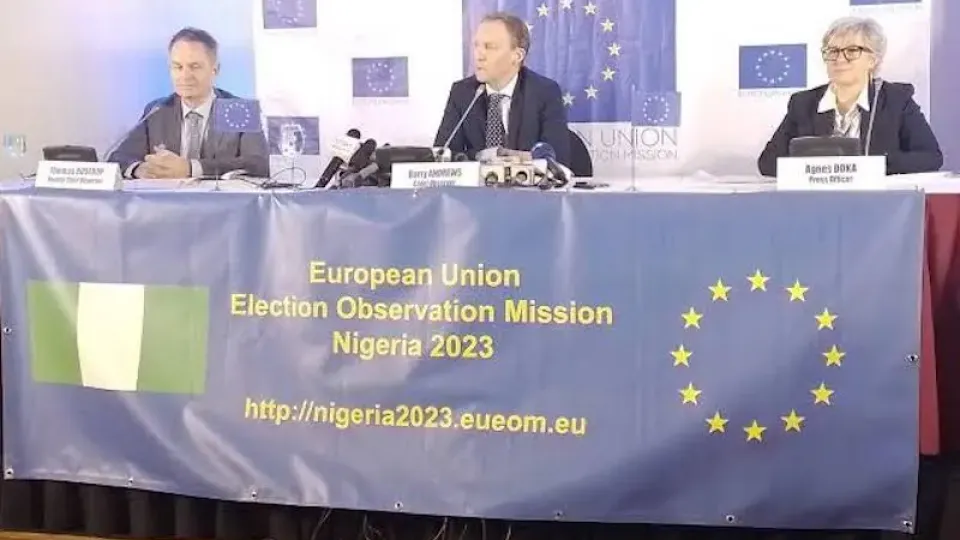from EMEKA OKONKWO in Abuja, Nigeria
ABUJA, (CAJ News) – RELATIONS between the European Union (EU) and the new administration in Nigeria, Africa’s largest nation, have gotten off to an acrimonious start.
This row comes after the European bloc discredited elections the latter held in February.
The falling-out is the latest twist to the controversy around the polls that propelled Bola Ahmed Tinubu (71) to the presidency. Again, it raises the long-held notion that Europe is bent on poking its nose into the internal affairs of African countries.
Nigeria is a former British colony.
The recent presentation of the EU Observation Missions (EU EOM) final report on Nigeria’s general elections is the source of a standoff between the European bloc and Africa’s largest economy.
Barry Andrews, Chief Observer of the EU EOM, released the report in the Nigerian capital, Abuja, where the mission observed concern that seems favourable to a court challenge by the main opposition parties that the elections were compromised.
“The election exposed enduring systemic weaknesses and therefore signal a need for further legal and operational reforms to enhance transparency, inclusiveness and accountability,” Andrews said on behalf of the mission.
He expressed the mission’s concern and proposed that in future, Nigeria ensures timely publication of results, protects the media, ends discrimination against women, ensures partiality by the Independent National Electoral Commission (INEC) and tightens the screws on electoral malpractices.
Tinubu’s office has reacted irately to the sentiments by the EU EOM and accused the mission and other forces of interference.
“We urge the EU and other foreign interests to be objective in all their assessments of the internal affairs of our country and allow Nigeria to breathe,” Dele Alake, Special Adviser to the President Special Duties, Communications and Strategy, hit back.
If Alake’s response is anything to go by, tensions have been brewing since May, when he disclosed the new government alerted the nation to “the plan by a continental multilateral institution” to discredit the 2023 general elections.
“While we did not mention the name of the organisation in the said statement, we made it abundantly clear to Nigerians how this foreign institution had been unrelenting in its assault on the credibility of the electoral process, the sovereignty of our country and on our ability as a people to organise ourselves,” Alake stated.
“We find it preposterous and unconscionable that in this day and age, any foreign organisation of whatever hue can continue to insist on its own yardstick and assessment as the only way to determine the credibility and transparency of our elections.”
Alake said now that the EU EOM had submitted its final report on the elections, “We can now categorically let Nigerians and the entire world know that we were not unaware of the machinations of the European Union to sustain its, largely, unfounded bias and claims on the election outcomes.”
EU, which lauds itself as a globally recognised and credible actor in international election observation and has since 2000 deployed over 200 EOMs, stated it carried out its work between January 11 and April 11 on the invitation of the INEC.
The Nigerian Presidency believes the EU mission was ill-equipped considering it observed the elections through 11 Abuja-based analysts, 40 election observers spread across 36 states and the Federal Capital Territory in a country that had 176 000 polling units.
Alake dismissed the “jaundiced report”, based on the views of the European mission’s accredited 110 observers from 25 EU member states, as well as Canada, Norway and Switzerland.
He said this was to sustain a stance contained in EU’s preliminary report released in March.
“We strongly reject, in its entirety, any notion and idea from any organisation, group and individual remotely suggesting that the 2023 election was fraudulent,” Alake said.
Previous Nigerian governments have accused European-based human rights groups of concocting abuse claims by the Nigerian military against citizens during anti-terrorism crackdowns.
The election of Tinubu as Nigeria’s 16th president since independence in 1960 and fifth after the restoration of civilian rule 1999 is the subject of a court challenge by the former ruling People’s Democratic Party (PDP) and Labour Party (LP).
The EU describes having robust trade relations with Nigeria and remaining the West African country’s most important trading partner for oil and non-oil exports.
Africa’s most populous country with an estimated 220 million people, Nigeria is a beneficiary of the EU foreign direct investment.
Prior to his inauguration on May 29, Tinubu embarked on a working visit to Europe.
According to his office, he engaged with investors and other key allies with the goal of marketing investment opportunities in the country and his administration’s readiness to enable a business-friendly climate through policies and regulations.
– CAJ News

